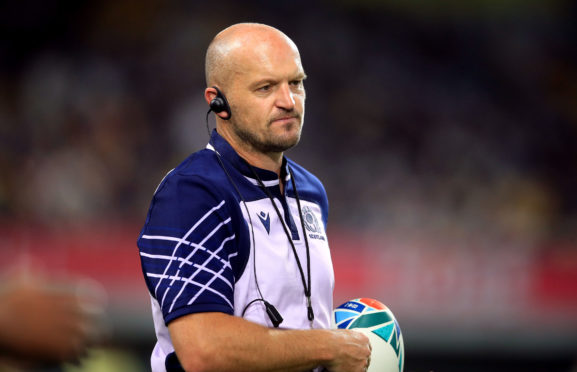Scotland head coach Gregor Townsend continues to have faith the crunch match with Japan will take place on Sunday in Yokohama when Typhoon Hagibis will have blown through and calm weather is expected.
The Scots remain firmly of the view that the game should be played at some point and their future in the tournament decided rightly and properly on the playing field.
Shortly after World Rugby announced their decision to cancel two Saturday games in the Tokyo Metropolitan area, Scottish Rugby released a strongly-worded statement indicating they expected contingency plans to be in place for the game to be played.
Townsend was more conciliatory, detecting from the tone of World Rugby’s decision not to cancel Sunday games as an indication they were confident those contests would proceed as scheduled.
“We believe the game hasn’t been cancelled because the weather forecast is much improved for Sunday,” he said. “It looks like the game will be played and that’s what we have to keep faith with.
“They have made the call with a lot of certainty and a lot of confidence that the game will go ahead on Sunday night. I would hope that everyone who is involved in the tournament would want the game to be played and that they will do all they can to ensure that it is.”
This could means playing at a different venue within the Tokyo area if the Yokohama Stadium is inaccessible or playing the game behind closed doors if fan safety is still compromised, he believed.
“The situation is changing a lot but what what we have been told is that Sunday looks clear now,” he continued. “Saturday is the day when the typhoon comes in and it comes in quite quickly. I have looked at the weather and Sunday night looks to be quite calm.
“What might happen is that the infrastructure might not be in place even although the weather is nice, and that’s where we have to believe and have faith in the organisers that the game will be played even if it’s behind closed doors or at a different venue.
“Who knows how severe the storm will be on Saturday. But it looks as though conditions will be fine on Sunday and it’s a night time quick off which gives us some extra time as well.”
A possible decision to cancel the game might not be necessary, he argued.
“This is the Rugby World Cup, the biggest tournament that we play in, played every four years and the third biggest sporting event in the world,” he continued. “Obviously we are involved in a game where a winner can go through with certain points and a loser could not go through.
“I’m sure that is has been in the minds of those who arranged the fixtures. There’s lots of different venues that might not be affected by the weather, there are training venues. Japan trained at Prince Chichibu Stadium, which has previously hosted international games.
“What do we need? We need officials, we need players. The way I read the rules was that you can’t change days but you could change venues and contingencies would be in place.
“I’ve since been told there is force majeure (measures in the rules) and things can change because of exceptional circumstances.
“It will make things very unusual for a World Cup in any sport to be decided by a game being called off on one day. Let’s say you’re looking out your hotel windows at 5 o’clock on Sunday afternoon and it’s sunny. It would be strange if a game couldn’t take place that day or the following day.”
Townsend is concerned that Scotland fans are heading into the storm area and urged them to pay careful attention to advice.
“The advice would be to stay inside, and we have to heed that advice.
“Japan is a country that deals with natural disasters a fair bit and it gets a lot of typhoons. I was watching a video that says this is the third super typhoon this year.
“There will be disruption but we would send the advice to all Scottish fans to stay inside. That’s what we will be doing for sure.”
Having a late decision – World Rugby can wait until up to six hours before kick off before cancelling the game – was not a problem for Scotland, although they will miss a planned training session on Saturday.
“That doesn’t pose too many problems – unless it all changes,” said the coach. “We, players and management, follow schedules, we know what team-run day is like and what matchday is like.
“We get on a bus two hours before the game. If we are doing that, then it means the game is getting played.”


